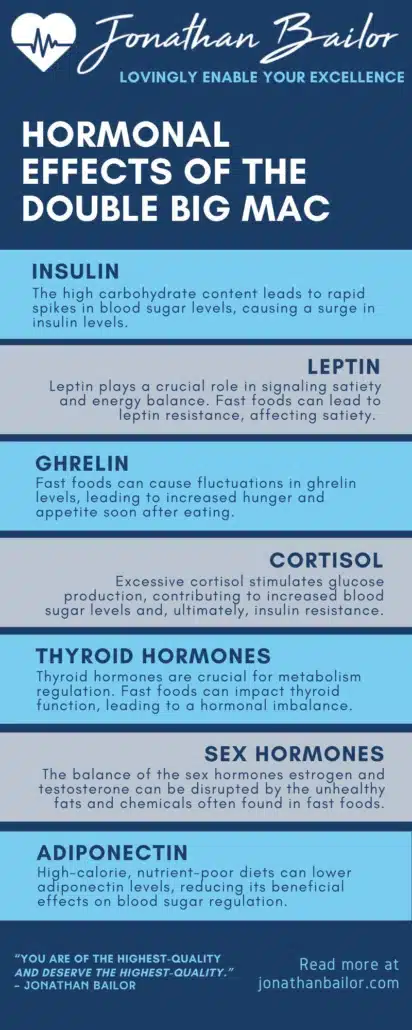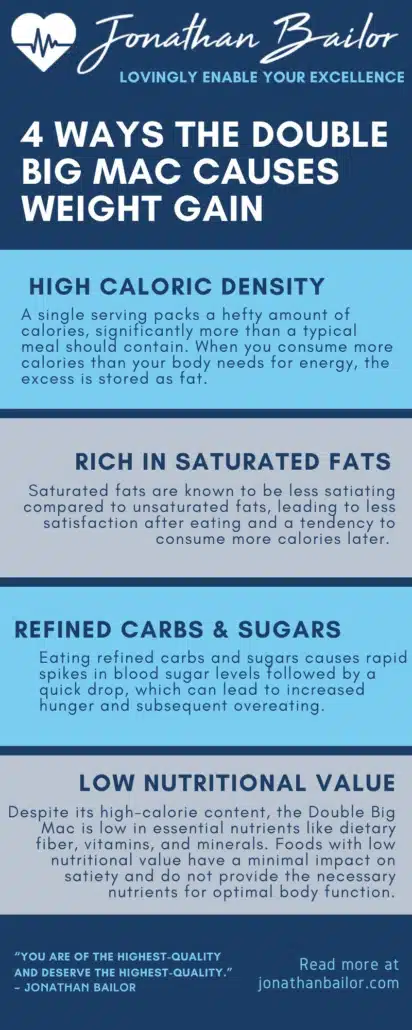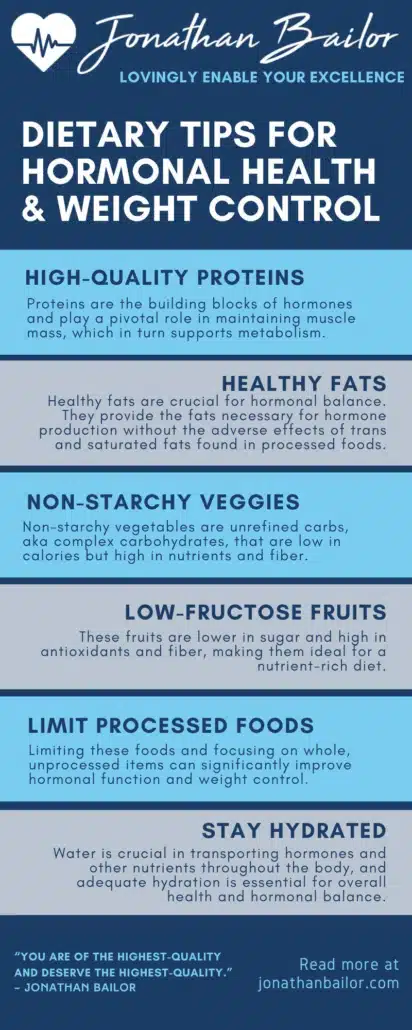Beware: Double Big Mac’s Weight Gain & Hormone Risks
Imagine this: a beloved fast food giant announces the return of an iconic burger—the Double Big Mac. The news might spark a momentary thrill for fast food enthusiasts, but here’s the crucial bit you need to know: indulging in such a meal isn’t just a casual cheat day choice. It’s a decision that could have far-reaching impacts on your health, weight, and even hormone balance. In this hormone health guide, Jonathan Bailor discusses the hormonal and weight issues you need to know before sinking your teeth into the Double Big Mac.
When it comes to our health, it’s easy to get swayed by the allure of familiar flavors, especially when they’re brought back in a grand, limited-time-only fashion. But let’s pause and consider what’s really at stake with such food choices. The Double Big Mac, like most fast food items, is a concoction high in calories, saturated fats, and sodium. This trio, while tantalizing to our taste buds, is a recipe for health risks—risks that go beyond just the number on the weighing scale.
What often slips under the radar is how such foods impact our hormones—the body’s chemical messengers. These hormones are key players in managing our weight, mood, and overall well-being. It’s like throwing a wrench into the delicate hormonal machinery when we overload our system with high-calorie, nutrient-poor foods. The result? Our body’s ability to regulate appetite, metabolism, and even stress can go haywire. In simple terms, we’ll likely gain weight and feel terrible!
Think about it: Is the fleeting pleasure of a fast-food burger worth the potential long-term effects on your body’s natural balance? Especially for those of us who have celebrated more than a few birthdays, it’s crucial to be mindful of how our dietary choices can affect our health. We owe it to ourselves to nurture our bodies with food choices that support, not disrupt, our well-being.
Now, this isn’t about demonizing fast food or instilling fear. It’s about making informed choices. When we understand the implications of our diet on our health, we can make decisions that align with our long-term well-being. And isn’t that a more rewarding path to take?
So, let’s talk about the health risks of the Double Big Mac.
Double Big Mac: Nutritional Value
When we unwrap the Double Big Mac, we’re not just opening a fast-food package; we’re unveiling a mosaic of nutritional components that have significant implications for our health. This iconic burger is, in essence, an augmented version of the classic Big Mac, featuring not two but four beef patties layered with cheese, lettuce, pickles, onions, and that signature sauce, all sandwiched between a three-part sesame seed bun.
Now, let’s break down what this translates to in terms of nutritional content. A single Double Big Mac packs a substantial caloric punch; it contains around 720 calories. To put that into perspective, it’s nearly a third of the daily caloric intake recommended for an average adult. But it’s not just the calories that we need to be mindful of. This burger brings with it about 38 grams of fat, of which 17 grams are saturated fat. Saturated fats are known contributors to cholesterol issues and heart health concerns.
Moreover, the Double Big Mac contains approximately 46 grams of carbohydrates and a staggering 1,340 milligrams of sodium—over half the daily sodium limit for a healthy adult. While it does offer 40 grams of protein, which is a vital nutrient for our muscles and overall body function, the high levels of fat, sodium, and calories overshadow this positive aspect.
It’s essential to understand that nutrients are not just numbers on a nutrition label; they are the building blocks and signals for our body’s functions. Consuming foods high in calories, saturated fats, and sodium sends our bodies a confusing mix of signals.
As we transition to discussing the hormonal and body weight effects of a Double Big Mac, it’s important to remember that the relationship between what we eat and how our body responds is intricate. The nutritional makeup of the Double Big Mac does more than just satiate hunger temporarily; it influences complex bodily processes, particularly our hormones, which in turn play a pivotal role in managing our body weight and overall health.
Hormonal Imbalance: The Hidden Cost of Fast Foods Like Double Big Mac
When we talk about the impact of fast foods, like the Double Big Mac, on our health, it’s not just about calories and nutrients. These foods also profoundly affect the delicate hormonal balance within our bodies. Hormones are like messengers that dictate a multitude of bodily functions, from appetite control to mood regulation. When disrupted, they can lead to various health challenges. Let’s explore 7 key hormones affected by consuming fast foods and the health problems associated with these hormonal changes.
1. Insulin
The high carbohydrate content, primarily from sugars and refined flour in fast foods, leads to rapid spikes in blood sugar levels. This triggers a surge in insulin, the hormone responsible for sugar regulation in our blood. Frequent insulin spikes can lead to insulin resistance, a condition where our cells become less responsive to insulin. This not only increases the risk of type 2 diabetes but also contributes to weight gain, particularly around the abdomen, and heightens the risk of cardiovascular diseases.
2. Leptin
Leptin plays a crucial role in signaling satiety and regulating energy balance. Fast foods, however, due to their high calorie and fat content, can disrupt leptin signaling. This disruption can lead to leptin resistance, where the body fails to recognize when it’s full, causing overeating and weight gain. Over time, leptin resistance can make weight loss more challenging and contribute to the development of obesity.
3. Ghrelin
Often termed the ‘hunger hormone’, ghrelin signals the brain when it’s time to eat. Fast foods can cause fluctuations in ghrelin levels, leading to increased hunger and appetite soon after eating. This can result in a cycle of continuous eating and snacking, contributing to caloric surplus and weight gain.
4. Cortisol
Known as the stress hormone, cortisol levels can be influenced by the high fat and sugar content of fast foods. Excessive cortisol stimulates glucose production, contributing to increased blood sugar levels and, ultimately, insulin resistance. Chronic high cortisol levels are also linked to increased abdominal fat, a higher risk of heart disease, and can impair cognitive performance over time.
5. Thyroid Hormones
Thyroid hormones are crucial for metabolism regulation. Diets high in processed foods and saturated fats, like fast foods, can impact thyroid function, leading to an imbalance in these hormones. This can result in either an underactive or overactive thyroid, leading to conditions like hypothyroidism or hyperthyroidism, respectively. These conditions can cause a range of symptoms, including fatigue, weight gain or loss, and mood disturbances.
6. Sex Hormones
The balance of the sex hormones estrogen and testosterone can be disrupted by the unhealthy fats and chemicals often found in fast foods. In men, excessive consumption of such foods can decrease testosterone levels, contributing to reduced muscle mass, fatigue, and lower libido. In women, it can lead to an increase in estrogen levels, potentially increasing the risk of conditions like polycystic ovary syndrome (PCOS), menstrual irregularities, and certain types of cancer.
7. Adiponectin
This hormone, released by fat cells, regulates glucose levels and fatty acid breakdown. High-calorie, nutrient-poor diets can lower adiponectin levels, reducing its beneficial effects on blood sugar regulation and fat oxidation. This can contribute to obesity, type 2 diabetes, and cardiovascular diseases.
Understanding the hormonal impact of fast foods like the Double Big Mac is essential for making informed dietary choices. While the immediate gratification of such meals can be tempting, the long-term effects on our hormonal health and overall well-being are substantial and often detrimental. It’s not just about avoiding weight gain; it’s about nurturing a hormonal environment conducive to optimal health.

Feeling Better Is Priceless, That's Why We Don't Put A Price On It!
“It’s Like A Free and Medically Valid Version of Noom and Weight Watchers Online”
~ Dr. Doctor Matthew Oleshiak, MD
Click the 'LEARN MORE' button below for free lifetime access to the fast fix program developed by Jonathan and top Ivy League Medical Doctors
LEARN MOREP.S. It's not a free trial. It's not part of the program for free. The entire program is free, forever, for real! No credit card needed.
4 Ways the Double Big Mac Promotes Weight Gain
The Double Big Mac, an emblematic fast food item, does more than just satisfy a momentary craving. Its composition and nutritional profile have a multifaceted impact on our body, particularly in promoting weight gain. While its effects on hormone imbalances have been extensively discussed, it’s crucial to understand how this fast food item directly contributes to weight gain. Let’s explore five specific ways the Double Big Mac can lead to an increase in body weight.
1. High Caloric Density
One of the most straightforward ways the Double Big Mac contributes to weight gain is its caloric density. A single serving packs a hefty amount of calories, significantly more than a typical meal should contain. When you consume more calories than your body needs for energy, the excess is stored as fat. This high caloric intake, especially when combined with a sedentary lifestyle, leads to a caloric surplus, which the body stores as adipose tissue, contributing to weight gain.
2. Rich in Saturated Fats
The burger is laden with saturated fats, stemming from its multiple beef patties and cheese. Saturated fats are known to be less satiating compared to unsaturated fats, leading to less satisfaction after eating and a tendency to consume more calories later. Additionally, diets high in saturated fats are linked to increased fat storage in the body, particularly in the abdominal area, further contributing to weight gain.
3. Refined Carbohydrates and Sugars
The bun of the Double Big Mac, made from refined flour, along with added sugars in the sauce, contributes to its high glycemic index. Eating refined carbs and sugars causes rapid spikes in blood sugar levels followed by a quick drop, which can lead to increased hunger and subsequent overeating. This cycle can increase overall caloric intake, promoting weight gain.
Fast food items like the Double Big Mac often come in larger portions than recommended. These oversized portions can distort our perception of a standard serving size, leading to chronic overeating. Regular consumption of such large portions, even if not always from fast food, can condition the body to expect and crave larger quantities of food, contributing to sustained caloric surplus and weight gain.
4. Low Nutritional Value
Despite its high-calorie content, the Double Big Mac is low in essential nutrients like dietary fiber, vitamins, and minerals. Foods with low nutritional value have a minimal impact on satiety and do not provide the necessary nutrients for optimal body function. This lack of nutrition can lead to a cycle of continuous hunger and further eating as the body seeks to fulfill its nutritional needs, again leading to increased calorie intake and weight gain.
Understanding these factors is key to making informed choices about our diet. While the occasional indulgence may not drastically alter our weight, regular consumption of foods like the Double Big Mac can significantly contribute to weight gain and associated health issues. It’s not just about resisting temptation; it’s about recognizing the broader impact of our dietary choices on our health and well-being.

Unlocking Hormonal Health and Weight Control: The Path to Nutritional Harmony
In pursuing hormonal balance and weight management, the most effective strategy lies not in restrictive diets or trendy eating patterns but in embracing a whole-food, nutritionally abundant dietary plan. This approach to eating focuses on foods that naturally support and regulate our hormones, contributing to a lower setpoint weight and overall better health.
- Prioritize High-Quality Proteins: Incorporating high-quality proteins into your diet is essential. Proteins are the building blocks of hormones and play a pivotal role in maintaining muscle mass, which in turn supports a healthy metabolism. Opt for sources like lean meats, fish, and legumes. These not only provide the necessary amino acids for bodily functions but also help in feeling fuller for longer, reducing the likelihood of overeating.
- Embrace Healthy Fats: Healthy fats, particularly those rich in omega-3 fatty acids, are crucial for hormonal balance. Foods like avocados, nuts, seeds, and fatty fish (such as salmon and mackerel) provide the fats necessary for hormone production without the adverse effects of trans and saturated fats found in processed foods.
- Load Up on Non-Starchy Vegetables: Non-starchy vegetables are unrefined carbs, aka complex carbohydrates, that are low in calories but high in nutrients and fiber. They should form the bulk of your diet. Vegetables like leafy greens, broccoli, cauliflower, and bell peppers provide essential vitamins and minerals and help regulate blood sugar levels, which is crucial for hormonal balance and weight control.
- Incorporate Low-Fructose Fruits: While fruits are an important part of a balanced diet, focusing on low-fructose varieties like berries and citrus fruits can more favorably impact your weight and hormonal health. These fruits are lower in sugar and high in antioxidants and fiber, making them ideal for a nutrient-rich diet.
- Minimize Processed Foods and Sugars: Processed foods and high-sugar items (refined or simple carbs) are the adversaries of hormonal health. They can disrupt insulin levels, increase inflammation, and lead to weight gain. Limiting these foods and focusing on whole, unprocessed items can significantly improve hormonal function and weight control.
- Stay Hydrated: Proper hydration is often overlooked in dietary plans. Water is crucial in transporting hormones and other nutrients throughout the body, and adequate hydration is essential for overall health and hormonal balance.
- Mindful Eating Habits: Beyond what you eat, how you eat is equally important. Mindful eating, which involves paying attention to hunger cues and eating without distraction, can help you recognize satiety and prevent overeating.
This healthy, hormonal healing dietary plan is about more than just losing weight; it’s about creating a harmonious environment within your body. By focusing on nutrient-rich, whole foods, you’re not just feeding your body; you’re nurturing it. This approach leads to natural weight regulation, improved hormonal balance, and enhanced overall well-being. Remember, the journey to better health doesn’t involve restrictive dieting but embracing a lifestyle that supports your body’s natural processes.

FAQs on Hormone Health
Q1: What role do hormones play in weight management?
A1: Hormones are integral to weight management as they regulate appetite, metabolism, and fat storage. Hormones like insulin, leptin, and ghrelin directly influence how much we eat, how our body uses food for energy, and where it stores excess calories. A hormonal imbalance can lead to weight gain by disrupting these processes, making it harder to lose weight even with diet and exercise.
Q2: How can diet affect hormonal health?
A2: Diet plays a crucial role in hormonal health. Foods high in refined sugars and unhealthy fats can disrupt hormonal balance, leading to conditions like insulin resistance. Conversely, a diet rich in whole foods, including lean proteins, healthy fats, and plenty of fruits and vegetables, supports hormonal balance by providing the nutrients needed for hormone production and regulation.
Q3: Can stress impact hormone levels and weight?
A3: Absolutely. Stress triggers the release of cortisol, the stress hormone, which can lead to increased appetite and cravings for high-calorie foods. Chronic stress can disrupt other hormonal balances, leading to weight gain, particularly around the abdomen. Managing stress through techniques like mindfulness, exercise, and adequate sleep is vital for maintaining hormonal balance and healthy weight.
Q4: Is there a connection between sleep and hormone health?
A4: Yes, sleep and hormone health are closely connected. Poor sleep can affect the production of hormones such as leptin and ghrelin, which regulate appetite. Lack of sleep can increase hunger and appetite, making weight management more challenging. Ensuring adequate and quality sleep is key to maintaining hormonal balance.
Q5: How does age affect hormonal health and weight?
A5: As we age, hormonal changes are natural, often leading to slower metabolism and changes in body composition. For example, post-menopausal women experience a drop in estrogen levels, which can contribute to weight gain. Being mindful of these changes and adapting your diet and lifestyle accordingly can help you manage your weight and maintain hormonal health as you age.
Embracing Hormonal Harmony: A Conclusion
In summary, our journey through the complexities of hormonal health reveals a clear message: mindful eating and lifestyle choices are pivotal. By understanding the impact of foods like the Double Big Mac and embracing a whole-food, nutrient-rich diet, we not only nurture our hormonal balance but also pave the way for sustainable weight management and overall well-being. If you found this exploration enlightening, please share it with your friends and family on social media platforms and via email. Together, let’s spread the word for healthier choices and a brighter, more balanced future.
Feeling Better Is Priceless, That's Why We Don't Put A Price On It!
“It’s Like A Free and Medically Valid Version of Noom and Weight Watchers Online”
~ Dr. Doctor Matthew Oleshiak, MD
Click the 'LEARN MORE' button below for free lifetime access to the fast fix program developed by Jonathan and top Ivy League Medical Doctors
LEARN MOREP.S. It's not a free trial. It's not part of the program for free. The entire program is free, forever, for real! No credit card needed.




